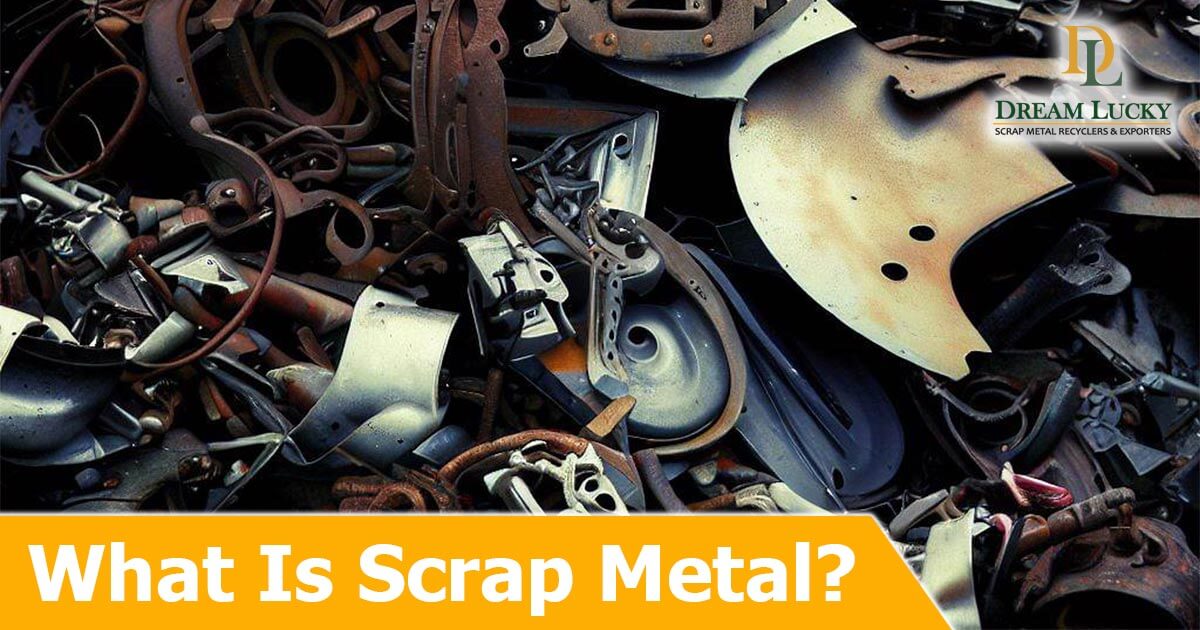
What is Scrap Metal?
Scrap metal refers to any discarded metal that can be recycled and repurposed. Each metal piece has its own story, often having been part of products or structures that served essential functions in our daily lives. It comes in various forms, from old car parts to unused construction materials.
As these products reach the end of their lifecycle, the metals within them retain their value, ready to be transformed and reused in countless ways.
These metals are broadly categorized into two types: ferrous, which contains iron, and non-ferrous, which doesn’t. A simple magnet test can help identify the type: if a magnet sticks, it’s ferrous; if not, it’s non-ferrous. Both types have unique properties and applications.
However, scrap metal is more than just discarded pieces of metal. It’s a valuable resource that plays a pivotal role in environmental conservation and the global economy.
What is Scrap Metal Used For?
Scrap metal, with its potential for reuse, plays a pivotal role in various industries. While recycling stands out as its primary use, the journey of scrap metal from being discarded to reincarnation is intricate and impactful.
1. Recycling Process
The heart of scrap metal’s utility lies in recycling. This process begins with the collection and sorting of different metals. Once sorted, the metal undergoes shredding to reduce its size, making it easier to handle and process. The shredded metal is then melted in a large furnace, purified to remove any impurities, and finally poured into moulds to form ingots or other shapes. These can be used to manufacture new products, completing the recycling loop.
2. Conserving Resources
Every piece of metal recycled is a step towards environmental conservation. By using scrap metal, we significantly reduce the need to mine fresh ore.
Mining activities often lead to habitat destruction, soil erosion, and a significant carbon footprint. Recycling helps in preserving these natural resources and reducing the environmental impact of mining.
3. Energy Efficiency
The benefits of scrap metal recycling extend to energy conservation. Producing new metals from raw ore requires a lot of energy, primarily due to the extraction and refining processes. In contrast, recycling scrap metal is far more energy-efficient.
For instance, recycling aluminium saves up to 95% of the energy required to produce it from raw materials. This energy conservation translates to reduced greenhouse gas emissions, contributing to the fight against climate change.
4. Economic Impact
Beyond environmental benefits, recycling scrap metal has a profound economic impact. It creates jobs in the recycling industry, stimulates growth in related sectors, and reduces costs for manufacturers who use recycled metals. This, in turn, can lead to more affordable products for consumers.
5. Innovation and Development
Scrap metal is also a catalyst for innovation. As industries recognize the value of recycled metals, there’s a push to develop new technologies and methods to improve the efficiency and effectiveness of metal recycling. This drive for innovation leads to advancements that benefit both the environment and the economy.
Is Scrapping Metal Worth It?
Absolutely! The value of scrap metal extends beyond its immediate monetary worth. Metals like copper, brass, and aluminium are particularly sought after due to their unique properties.
Many valuable metals end up in landfills due to misconceptions or lack of awareness. For instance, people might discard old electronics, not realizing the gold or copper they contain. Educating the public about the value and process of metal recycling is crucial to harnessing this wasted potential.
Recycling scrap metals not only conserves energy—saving up to 95% of the energy required for producing new metals from raw ore—but also reduces greenhouse gas emissions and the need for mining fresh ore. This conservation effort preserves our planet’s resources and reduces environmental impact.
Moreover, the metal recycling industry stimulates economic growth, providing jobs and offering lucrative opportunities for businesses and individuals. Given these multifaceted benefits, scrapping metal is both an environmentally and economically sound decision.
How to Get Started with Metal Recycling
If you’re keen to dive into the world of metal recycling, here are some steps to kickstart your journey:
- Identify. Learn to identify different metals. Familiarize yourself with their appearance, weight, and other distinguishing features.
- Collect. Start collecting scrap metal from around your home or workplace. Store them separately for easier processing.
- Sell. Find a local scrap yard or recycling facility. Ensure they follow ethical recycling practices and offer a fair price for your collection.
Understanding and participating in metal recycling is a step towards a sustainable future. As we become more conscious of our environmental impact, every piece of metal we recycle brings us closer to a greener tomorrow.
So, the next time you come across discarded metal, remember its value and consider giving it a new lease of life through recycling.
Omer Bekhit
The dedicated owner and operator of Dream Lucky Scrap Metal. He has been at the forefront of ethical scrap metal recycling, exporting, and dealing. With a hands-on approach to the business, Omer ensures that every transaction is conducted with transparency and sustainability in mind.